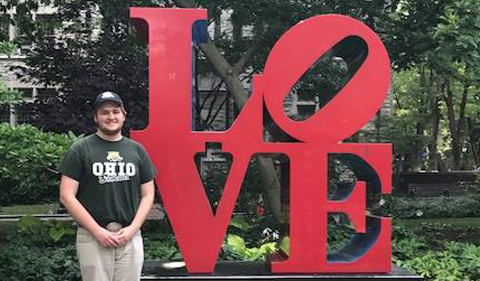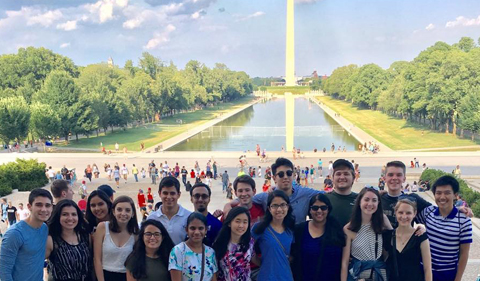By Brandon Niese ’19
B.S. Engineering Physics, Honors Tutorial College
Living in Philadelphia for the summer in 2017 and working in a biophysics lab at a major cancer research center has been a life changing experience. Not only did I learn from scientists who are at the forefront of cancer research, but I was able to further develop lab and communication skills related to solving some of the most pressing medical challenges we face today.
I would highly recommend doing an internship of this kind for any budding physicist. The future of research is very much interdisciplinary, and I predict that the most successful researchers and scientist will be the renaissance men and women. The best medical or technological advancements will come from someone who can think outside of the box, someone that can take a little bit from biology, physics, chemistry, and every other field. Obviously no one can know everything the universe has to offer, but that doesn’t mean we should try to explore as much as we can.
I spent eight weeks in a research lab under the direction of Dr. Dennis Discher as part of the Cancer Systems Biology Consortium and Physical Sciences in Oncology Network’s Summer Undergraduate Research Program at the University of Pennsylvania in Philadelphia. Discher is director of the University of Pennsylvania’s Physical Sciences Oncology Center, and his research is at the interface of biological physics and soft matter science and engineering.
The group I was assigned to included a post-doctoral researcher, plus several graduate and undergraduate students. The challenge we explored was to determine if there is a correlation between cell cycle phase and pore-migration induced DNA damage in bone cancer.
I used U2OS cells (osteosarcoma, or bone cancer cells) in conjunction with a transwell, a membrane with tiny micron sized pores that the cells migrate through. I compared the DNA damage on the top of the transwell (before constriction) and the damage on the bottom (after constriction). Then, using different techniques and image analysis I characterized each cell into cell cycle phase and compare them.
Migration through narrow constrictions occurs frequently in cancer biology; it is one of the first steps in metastasis. Many studies have shown that once metastasis occurs the cancer becomes much deadlier. We wanted to learn more about how these cancer mutations occur. We knew that pore-migration induce DNA damage is correlated to genomic variations. We focused on the cell cycle because most mutations happen during replication, and we wondered if this replication stress changes the amount of damage caused by these pore-migrations.
Along with working in the lab, part of the internship involved all 14 of us interns from different institutions meeting via videoconference twice a week where we participated in a mini-DREAM challenge. DREAM challenges pose fundamental questions about systems biology and translational medicine. The conference organizers invited us to learn the programming language R and basic computational techniques and how to apply them to biological data.
As part of the internship, I attended my first conference and participated in a poster presentation during Cancer Systems Biology Consortium & Physical Sciences-Oncology Network Summer Undergraduate Research Conference in July. It was held on the National Institutes of Health Bethesda, Md., campus. I had a chance to present my work as well as receive constructive feedback. And I got to network with a bunch of great future and current researchers in biological physics.
One of the challenges I had during my internship was keeping up with researchers who presented their work at weekly seminars at the Physical Sciences in Oncology Center. The topics were very high level and often included biological topics that I wasn’t familiar with. It was thrilling and humbling to make the effort to communicate with biologists and other researchers that knew a lot more about biological topics than I do.
I loved the challenge of actively listening, as well as being able to quietly look up a key word on google and quickly connecting back to a presentation. As a result of this experience, I’m more comfortable in settings where I’m not familiar with certain research ideas, and I am better prepared to handle myself in situations where others know a lot more than I do about a topic under discussion.





















Comments